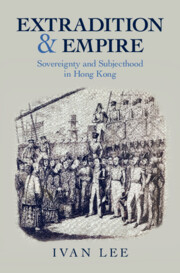Book contents
- Extradition and Empire
- Studies in Legal History
- Extradition and Empire
- Copyright page
- Contents
- Illustrations
- Acknowledgements
- Abbreviations of Archival Sources
- Introduction
- 1 Improvising Sovereignty
- 2 Domesticating Mobility
- 3 Navigating Disorder
- 4 Rationalising Reciprocity
- 5 Founding Alsatia
- Conclusion
- Notes
- Index
- Studies in Legal History
Introduction
Dimensions of Extradition and Empire
Published online by Cambridge University Press: 10 September 2025
- Extradition and Empire
- Studies in Legal History
- Extradition and Empire
- Copyright page
- Contents
- Illustrations
- Acknowledgements
- Abbreviations of Archival Sources
- Introduction
- 1 Improvising Sovereignty
- 2 Domesticating Mobility
- 3 Navigating Disorder
- 4 Rationalising Reciprocity
- 5 Founding Alsatia
- Conclusion
- Notes
- Index
- Studies in Legal History
Summary
This chapter makes a case for rethinking the early history of colonial Hong Kong – for seeing the young colony as an ambiguous juridical space, shaped and bounded by inchoate ideas of extradition. History has forgotten this feature of early Hong Kong because most studies have assumed, anachronistically, that the Opium War treaties of 1842–43 instituted ‘extradition’ between Hong Kong and China, in addition to British ‘extraterritoriality’ in China. In fact, these ideas took time to crystallise from fuzzier arrangements for dividing jurisdiction. This jurisdictional ambiguity coincided with the belated rise of territorial thinking in the British Empire. It also coincided with ongoing developments in the British approach to surrendering fugitives to foreign states – a procedure that legal actors were only starting to refer to as ‘extradition’. So, historicising the idea of extradition allows us to understand how British actors perceived their practices in Hong Kong and China in comparison to their practices elsewhere. This perspective reveals that the imperial origins of extradition involved crucial experiments in the colonial ordering of territory, people, and executive power.
Keywords
Information
- Type
- Chapter
- Information
- Extradition and EmpireSovereignty and Subjecthood in Hong Kong, pp. 1 - 19Publisher: Cambridge University PressPrint publication year: 2025
Accessibility standard: WCAG 2.0 A
Content Navigation
Allows you to navigate directly to chapters, sections, or non‐text items through a linked table of contents, reducing the need for extensive scrolling.
Provides an interactive index, letting you go straight to where a term or subject appears in the text without manual searching.
Reading Order & Textual Equivalents
You will encounter all content (including footnotes, captions, etc.) in a clear, sequential flow, making it easier to follow with assistive tools like screen readers.
You get concise descriptions (for images, charts, or media clips), ensuring you do not miss crucial information when visual or audio elements are not accessible.
You get more than just short alt text: you have comprehensive text equivalents, transcripts, captions, or audio descriptions for substantial non‐text content, which is especially helpful for complex visuals or multimedia.
Structural and Technical Features
You gain clarity from ARIA (Accessible Rich Internet Applications) roles and attributes, as they help assistive technologies interpret how each part of the content functions.
